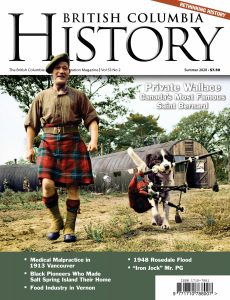
British Columbia History – Summer 2020
English | 49 pages | pdf | 19.97 MB
Editors Note – Accessible— not Ephemeral
The longevity of what we do as historians and the power of technology have been top of mind for me these days. Recently, I received an email from Seattle researcher Phil Goldenman wondering where he might obtain the endnotes from “The Hudson’s Bay Company and Kettle Falls Salmon,” an article by Chris Bogan published in the Fall 1996 edition of the BC Historical News (now British Columbia History). The back issues of the magazine are available to researchers around the world through our partnership with UBC Library and their digital Open Collections. Chris Bogan was the 1995 winner of the scholarship essay prize. The essay was condensed for publication in 1996 and contains a note that any researcher who wishes for “a copy of the original (with its 109 footnotes) could send $3” to editor Naomi Miller. Twenty-four years later, a researcher would like those important source notes. Sadly, I do not have the files from previous editors, and Naomi has not kept these files, but perhaps one of our readers knows Chris Bogan and the connection will be made.
This request reinforced for me the fact that digital records are not ephemeral. Instead digitization gives new life to older works and provides easy access to people across vast distances. Digitization makes it easier for historians to do what they have always done — to continue to build on the work of others.
While it makes it easier for researchers to access collections around the world, offering technological solutions comes with its own concerns of security, capacity, and cost. The internet is not free, and entering it as a provider comes with a steep learning curve.
The steep learning curve is something that many of you have experienced in recent weeks. Technology as a solution to the social isolation of the COVID-19 pandemic has become very much the talk of 2020. However, now many weeks into quarantine, there are articles about Zoom fatigue and questions about whether people will return to public spaces after indulging in so
much content from their couches. The other lingering question is whether people will pay for digital content once the free offers cease.
I hope that by the time this issue of British Columbia History reaches your mailbox or screen that we are all beginning to enjoying socializing again — supporting our cultural organizations and the stewardship of past knowledge while exploring our beautiful province.
Until next time,
Andrea Lister
Editor
Download from: